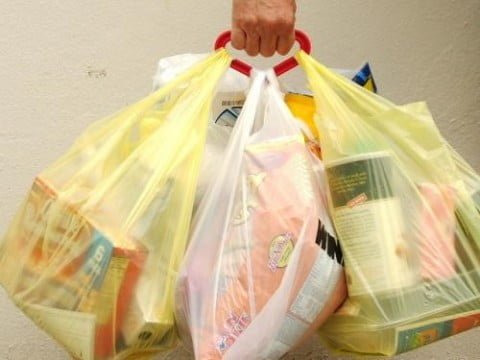Proposal adopted to oblige member states to reduce sales of non-reusable bags
In Italy, in spite of bans, every citizen uses 181 a year. Danes and Finns use only 4
They are practical and light – resistant enough to be used just once, but not enough to be reused. So much that these super light plastic bags, the ones with a thickness less than 50 microns, are almost always “disposable” and quickly pass from consumer’s homes to the environment, where they last even up to hundreds of years, especially in the form of marine waste which threatens fish and birds. This is why the European Commission has decided to declare war on these plastic bags made of light weight material, adopting a proposal for a law that requires member states to reduce use.
Technically, the proposal modifies the directive on packaging and packaging waste, introducing 2 new elements. On one hand it requires member states to adopt measures to reduce consumption of thinner plastic bags, therefore leaving “disposable” ones more at risk. On the other hand, they leave it up to the states to choose which type of measure to use to reach the objective: such as economic measures through taxes and duties, national reduction targets or marketing restrictions, always respecting the regulations regarding the internal market treaty on use in the EU.
Our country was already moving in this direction in 2006, introducing a ban on disposable bags that are not biodegradable and compostable, which went into effect in January 2011. A choice that cost Italy the opening of an infringement procedure from the European Commission, who said the ban did not comply with the rules regarding free circulation of merchandise. But today the procedure could be interrupted by the new proposal: “The Commission could decide to freeze” the procedure, explained the European Environment Commissioner, Janez Potočnik. “It has not been decided yet- he added – but the situation is no longer the same” as when the procedure was opened.
Indicating that the road is passable, are excellent results obtained by some member states that have already drastically reduced the use of this type of plastic bags, opting for taxation and other measures. This is not the case in Italy where, in spite of the ban, they are among the countries that pollute more than the average: we use 181 “disposable” plastic bags every year compared to a European standard of 175. But there are those who beat us, like Poland, Portugal and Slovenia, where they reach 466. The most respectful of the environment are the Danes and Finns, who barely use 4 bags a year per person. In 2010 they were estimated to be around 98.6 billion plastic bags put on the market in the European Union, both “disposable” and reusable, with an average of 198 bags used per person every year.
“Every year in Europe there are more than 8 billion plastic bags that turn into trash causing serious damage to the environment” calculates Potočnik, adding: “Some member states have already been able to limit their use very much and if others would do as much, consumption in all of the EU could even be reduced by 80%.”
Letizia Pascale



![Un motoscafo in Svezia. Nell'Ue si pone un problema di mancato riconoscimento delle patenti nautiche [foto:
Matti Blume, Wikipedia Commons. Copyright: Creative Commons Attribution-Share Alike]](https://www.eunews.it/wp-content/uploads/2024/11/motoscafo-Saltsjoen_Stockholm_P1090679-350x250.jpg)






![Un motoscafo in Svezia. Nell'Ue si pone un problema di mancato riconoscimento delle patenti nautiche [foto:
Matti Blume, Wikipedia Commons. Copyright: Creative Commons Attribution-Share Alike]](https://www.eunews.it/wp-content/uploads/2024/11/motoscafo-Saltsjoen_Stockholm_P1090679-120x86.jpg)